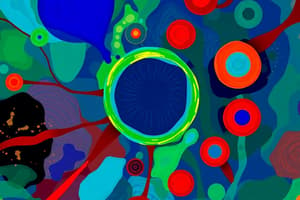Podcast
Questions and Answers
Which organelle is responsible for generating energy through respiration in a cell?
Which organelle is responsible for generating energy through respiration in a cell?
- Endoplasmic reticulum
- Mitochondria (correct)
- Lysosomes
- Golgi apparatus
What is the function of the Golgi apparatus in a cell?
What is the function of the Golgi apparatus in a cell?
- Energy generation
- Protein synthesis
- Cellular respiration
- Protein sorting and secretion (correct)
Where is the genetic material (DNA) of a cell housed?
Where is the genetic material (DNA) of a cell housed?
- Vacuoles
- Nucleus (correct)
- Cytoplasm
- Mitochondria
What is the primary function of ribosomes in a cell?
What is the primary function of ribosomes in a cell?
Which organelle converts sunlight into chemical energy during photosynthesis?
Which organelle converts sunlight into chemical energy during photosynthesis?
Which component of a cell acts as semi-permeable barriers controlling molecule movement?
Which component of a cell acts as semi-permeable barriers controlling molecule movement?
What is the primary role of the cytoplasm in a cell?
What is the primary role of the cytoplasm in a cell?
Which organelle assists in protein synthesis and folding within a cell?
Which organelle assists in protein synthesis and folding within a cell?
What is the function of lysosomes in a cell?
What is the function of lysosomes in a cell?
Which organelle regulates growth, reproduction, and metabolism through transcription and translation processes?
Which organelle regulates growth, reproduction, and metabolism through transcription and translation processes?
Flashcards are hidden until you start studying
Study Notes
Understanding Cell Structure in Biology
Cells are the fundamental units of life, and understanding their structures is critical to studying organisms across various branches of biology. A cell consists of several components, including the nucleus, cytoplasm, membranes, endoplasmic reticulum, Golgi apparatus, ribosomes, mitochondria, chloroplasts (if the cell is photosynthetic), lysosomes, vacuoles, and cytoskeleton. These components each serve distinct purposes in maintaining cellular function and health.
The nucleus houses the genetic material (DNA) of the cell. It regulates growth, reproduction, and metabolism through mechanisms involving transcription and translation processes. The cytoplasm, on the other hand, is the gel-like fluid inside the cell where the majority of chemical reactions occur. It holds enzymes responsible for energy production and nutrient breakdown.
Membranes, being semi-permeable barriers, control what enters and leaves cells, ensuring homeostasis. Membranes play a role in transporting molecules between the cell and the environment. The endoplasmic reticulum assists in protein synthesis and folding within the cell. The Golgi apparatus acts as a sorting station for proteins destined for secretion outside the cell or incorporation into the plasma membrane. Ribosomes are involved in protein synthesis from mRNAs. Mitochondria generate energy through respiration, while chloroplasts convert sunlight into chemical energy during photosynthesis. Lysosomes break down waste and damaged parts of the cell, and vacuoles store water and other essential liquids. Finally, the cytoskeleton provides structural support and enables movement within cells.
Each component works together to maintain the proper functioning of a cell, ensuring survival and facilitating communication among cells. Understanding these structures is vital for comprehending how life operates at the subcellular level.
Studying That Suits You
Use AI to generate personalized quizzes and flashcards to suit your learning preferences.




